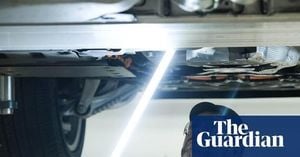Proposed changes to French vehicle inspections could mandate annual checks for older cars, aimed at improving road safety and reducing pollution.
Recent discussions among French lawmakers reveal plans to potentially alter the frequency of mandatory vehicle inspections from every two years to annually for cars older than ten years. This initiative arises amid increasing concerns over road safety and the environmental impact of aging vehicles. Currently, the average age of cars on French roads is 11.2 years, which poses significant challenges for maintaining safe driving standards.
The push for these changes is partly influenced by alarming findings from TÜV, Germany's technical inspection association, which reported approximately 150,000 vehicles with dangerous defects circulating on its roads. Authorities are worried this trend could replicate itself across France, where nearly 39.3 million cars are registered, many of which are well beyond the ten-year mark.
According to reports, the new legislation might come as early as the year 2025, significantly impacting how often certain drivers—notably those with older vehicles—will need to get their cars inspected.
The current vehicle inspection system costs between €80 and €120, which could add financial strain to car owners if inspections are required annually rather than biennial. Many French citizens might be left wondering how they will budget for these impending changes, especially those who might already be struggling with the costs of vehicle maintenance.
"150,000 vehicles with 'dangerous defects' circulaient outre-Rhin," highlights the urgency of the situation as echoed by law-makers who seek to avert similar outcomes on French soil.
Critics of the proposed changes argue the financial burden could disproportionately affect lower-income families, potentially deterring some from owning cars. Supporters claim the shift is necessary to establish safer driving conditions and protect the environment.
This overhaul will not only redefine the logistics of vehicle ownership but raises questions about how drivers will adapt to such heightened scrutiny. There is also apprehension about how effectively the enforcement of these regulations will occur.
France’s automotive industry faces significant scrutiny amid these discussions. The government's move to increase the frequency of inspections may spark fear and resistance among consumers wary of additional costs associated with owning older cars, leading to potential changes in purchasing behavior.
Public sentiment on this matter will be pivotal as the debate progresses. Officials are already observing current trends where the age of vehicles correlates with rising repair costs, leading to tougher accessibility for poorer individuals seeking reliable transportation.
At the culmination of this discussion, it is clear the French vehicle inspection system may undergo considerable transformations, fundamentally altering how safety is prioritized between the government and individual drivers. It remains to be seen whether these legislative changes will improve public safety and environmental conditions or if they will create more obstacles for the everyday driver.



